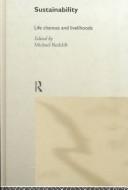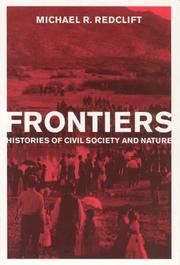| Listing 1 - 7 of 7 |
Sort by
|

ISBN: 9282794717 1134644523 0203066901 0203259467 1280330414 1134644531 9780203259467 9780203066904 9780415196178 0415196175 9780415196185 0415196183 9781134644537 Year: 2000 Publisher: London New York Routledge
Abstract | Keywords | Export | Availability | Bookmark
 Loading...
Loading...Choose an application
- Reference Manager
- EndNote
- RefWorks (Direct export to RefWorks)
The concept of sustainability is traditionally viewed in exclusively environmental terms. Sustainability: Life Chances and Livelihoods links peoples livelihoods and life chances to the concept of sustainability by examining the way in which social and economic processes complement and compound environmental change. Looking at the main ingredients of sustainable development - health, economic policy, land use, ethics and education, in both the north and south, this book demonstrates the way in which the life chances of individuals both effect and are affected by, their environments.Sust
Sustainable development --- Environmental policy --- Développement durable --- Environnement --- Politique gouvernementale --- -Sustainable development --- -Development, Sustainable --- Ecologically sustainable development --- Economic development, Sustainable --- Economic sustainability --- ESD (Ecologically sustainable development) --- Smart growth --- Sustainable economic development --- Economic development --- Environment and state --- Environmental control --- Environmental management --- Environmental protection --- Environmental quality --- State and environment --- Environmental auditing --- Environmental aspects --- Government policy --- -Environmental policy --- Développement durable --- Sustainable development. --- Environmental aspects. --- Social aspects. --- Social Sciences and Humanities. Economics --- Environmental Economics.

ISBN: 1282097539 9786612097539 0262282186 1429410019 9780262282185 9781429410014 9780262681605 0262681609 9780262182546 0262182548 0262264390 9780262264396 9781282097537 6612097531 Year: 2006 Publisher: Cambridge, Mass. : MIT Press,
Abstract | Keywords | Export | Availability | Bookmark
 Loading...
Loading...Choose an application
- Reference Manager
- EndNote
- RefWorks (Direct export to RefWorks)
In Frontiers, Michael Redclift examines the relationship between nature and society in frontier areas--contested zones in which rival versions of civil society vie with one another, often over the definition and management of nature itself. Drawing on his own fieldwork and extensive archival research, Redclift presents five cases in which civil societies emerged in frontier areas either to manage common property or to legitimize private holdings: common-pool resource management in the Spanish Pyrenees, European settlement on the forest frontier in nineteenth-century Canada, conflicts over land and water resources in coastal Ecuador, Mayan civil unrest in the Yucatan peninsula, and the encroachment of tourism on the Mexican Caribbean coast.Redclift describes a dialectical process in frontier regions in which human societies and their environments influence and illuminate one another: the frontier can be seen as a crucible in which both nature and civil institutions develop and "co-evolve." In each of the five case studies, he argues, migration and land settlement gave rise to ideologies of nature that reflected not only the social and ethnic characteristics of the settlers but also the the effects of market forces on the natural environment. In most of these areas the natural environment was transformed by the pressure of the market, especially global markets. Resistance to market pressure created new avenues for political activity and the representation of cultural identity. Frontiers deepens and broadens our understanding of the role of the frontier, which, Redclift argues, needs to be considered within a global context that is of continuing importance today.
POLITICAL SCIENCE --- History & Theory --- Environmental management. --- Civil society. --- ENVIRONMENT/General --- SOCIAL SCIENCES/Anthropology & Archaeology --- Social contract --- Environmental stewardship --- Stewardship, Environmental --- Environmental sciences --- Management --- Environnement --- Société civile --- Gestion

ISBN: 0416321305 0416321402 9780416321302 9780416321401 0415066026 9780415066020 Year: 1984 Publisher: London ; New York : Methuen,
Abstract | Keywords | Export | Availability | Bookmark
 Loading...
Loading...Choose an application
- Reference Manager
- EndNote
- RefWorks (Direct export to RefWorks)
Environment. --- Income. --- Developing Countries. --- Internationality. --- Environmental policy --- Income distribution --- International economic relations. --- Environnement --- Revenu --- Relations économiques internationales --- Politique gouvernementale --- Répartition --- Environmental policy. --- Income distribution. --- Geografie --- Economische geografie --- Ontwikkeling. --- Developing countries. --- Environmental policy - Developing countries --- Income distribution - Developing countries --- International economic relations

ISBN: 0415196175 0415196183 1134644523 0203259467 0203066901 1134644531 1280330414 9780203259467 9780203066904 9780415196178 9780415196185 9781134644537 9781134644483 9781134644520 Year: 2000 Publisher: London ; New York : Routledge,
Abstract | Keywords | Export | Availability | Bookmark
 Loading...
Loading...Choose an application
- Reference Manager
- EndNote
- RefWorks (Direct export to RefWorks)
The concept of sustainability is traditionally viewed in exclusively environmental terms. Sustainability: Life Chances and Livelihoods links peoples livelihoods and life chances to the concept of sustainability by examining the way in which social and economic processes complement and compound environmental change. Looking at the main ingredients of sustainable development - health, economic policy, land use, ethics and education, in both the north and south, this book demonstrates the way in which the life chances of individuals both effect and are affected by, their environments.Sust
Economic development --- Sustainable development. --- Social Sciences and Humanities. Economics --- Environmental aspects. --- Social aspects. --- Environmental Economics. --- Eco-development --- Ecodevelopment --- Development, Sustainable --- Ecologically sustainable development --- Economic development, Sustainable --- Economic sustainability --- ESD (Ecologically sustainable development) --- Smart growth --- Sustainable development --- Sustainable economic development --- Environmental aspects
Book
ISBN: 9781848440883 Year: 2010 Publisher: Northampton, MA : Edward Elgar Pub.,
Abstract | Keywords | Export | Availability | Bookmark
 Loading...
Loading...Choose an application
- Reference Manager
- EndNote
- RefWorks (Direct export to RefWorks)
Human ecology. --- Sustainable development --- Environmental policy --- Social ecology --- Ecologie humaine --- Développement durable --- Environnement --- Ecologie sociale --- Politique gouvernementale
Book
ISBN: 1134833032 1134833040 1138176087 1280320486 0203427904 Year: 1994 Publisher: London ; New York : Routledge,
Abstract | Keywords | Export | Availability | Bookmark
 Loading...
Loading...Choose an application
- Reference Manager
- EndNote
- RefWorks (Direct export to RefWorks)
This book marks a watershed in the social sciences. The qualitative, critical perspective of sociology and allied disciplines challenges the technocentric `managerialism' which dominates environmental policy, its discourse and its impact. The authors explore the relationship between social theory and sustainability in an attempt to transend technical rhetoric and embrace a broader understanding of `nature'.

ISBN: 1859725953 Year: 1997 Publisher: Aldershot : Ashgate,
Abstract | Keywords | Export | Availability | Bookmark
 Loading...
Loading...Choose an application
- Reference Manager
- EndNote
- RefWorks (Direct export to RefWorks)
| Listing 1 - 7 of 7 |
Sort by
|

 Search
Search Feedback
Feedback About UniCat
About UniCat  Help
Help News
News